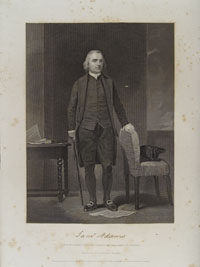Samuel Adams (1722-1803)

Samuel Adams was an early and exceptionally influential leader of Bostonians from resistance to outright conflict with the British government in the 1760s and 1770s. Adams helped organize the Sons of Liberty, signed the Declaration of Independence, and was governor of Massachusetts.
Born in Boston on September 27, 1722, the son of a brewer, Adams received both bachelor's and master's degrees from Harvard, where he argued in a thesis the legality of resisting governments that abuse the rights of its citizens. His first foray into politics was in 1748 as a founder of The Public Advertiser, which opposed the British navy's impressment of sailors and the nature of his colony's involvement in the American phase of the War of Austrian Succession (1744-1748). Adams then held a variety of minor public offices, including tax collector. He was so lax in pursuing his duties that he came to owe the province £8,000 in tax arrears (John Hancock paid it to save Adams).
In 1764 Adams and Hancock were elected to the Massachusetts assembly just as word of the passage of the Stamp Act reached the colonies. His cousin John Adams described Adams in 1765 as "zealous, ardent and keen in the cause" as he wrote pamphlets and essays urging his fellow Bostonians to resist what he believed were the illegal actions of Parliament. Historians have speculated that Adams was the driving force behind the protests that resulted in the Boston "Massacre" in March 1770 and the Boston Tea Party in December 1773, but there is little direct evidence of his involvement. It is clear that his influence among the middling and lower sorts in Boston who participated in those events was of such strength that neither would have taken place without his support. That's what Lieutenant Governor Thomas Hutchinson reported to imperial officials in London, who then marked Adams and Hancock as the principle figures in Boston's revolutionary circle. Adams also was one of the main organizers of the first committees of correspondence in 1772, which connected the town meetings of Massachusetts to one another.
Believing rumors that they were to be arrested for treason in the wake of the Coercive Acts of 1774, Adams and Hancock left Boston in February 1775 and were in Concord on April 19, 1775, when British troops first clashed with local militia. Adams then played a leading role in the Continental Congress and strenuous advocated for independence. In 1780 he returned to Boston where he helped write the state's constitution and campaigned for its adoption by the town meetings. Later Adams opposed the federal constitution of 1787 (although he changed his mind and argued for its ratification) and, oddly enough, Daniel Shays' tax revolt.
Adams served as lieutenant governor of Massachusetts, under Hancock, from 1789 until Hancock's death in 1793, when Adams succeeded to the higher office. He remained governor until his retirement in 1797. He died on October 2, 1803.




